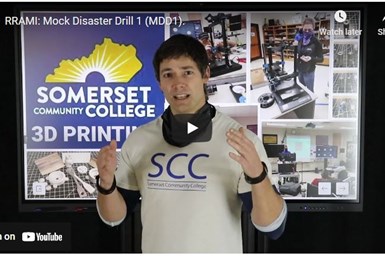Rapid Response AM Initiative Holding Mock Disaster Drill Feb. 1
Group testing rapid 3D printing response to manufacture substantial amounts of critical supplies in the event of emergencies.
The Rapid Response Additive Manufacturing Initiative (RRAMI) – Mock Disaster Drill 1 will be held on Monday, Feb. 1 in Kentucky. The RRAMI project was developed by Eric Wooldridge and Heather Beebe of Somerset Community College (SCC) in Kentucky to enable a statewide, variable location, rapid 3D printing response in the event of emergencies (such as COVID-19, natural disasters or other calamities) to manufacture substantial amounts of critical supplies.
The RRAMI Mock Disaster Drill will be a first of its kind test event to determine how quickly and effectively a well-coordinated system of remote 3D printing production sites, with minimal operators, separated by hundreds of miles can simultaneously fabricate products that would be necessary in an emergency event.
Products that would no longer be available due to a breakdown of the conventional manufacturing supply chain will be produced, such as personal protection equipment (PPE), hardware components or vital tools. The RRAMI system will initially be composed of four to six college sites across Kentucky that have significant quantities of similar low-cost additive manufacturing (AM) equipment, trained experts and located in regions of potential need. The first test product during MDD1 will be 3D printed headbands that can be quickly assembled with Plexiglas and elastic to form a face shield.
Through federal funding, the RRAMI project was green lit in the summer of 2020, sites were set up, staff was trained and the system is now preparing for its first Mock Disaster Drill (MDD1) to occur at 9 a.m. EST on Feb. 1st 2021. The Mock Disaster Drill will last 72 hours. SCC will provide real-time data feeds of the MDD1 progress and results.
The RRAMI network includes five Kentucky Community and Technical College System (KCTCS) sites, Somerset Community College (SCC), Jefferson Community and Technical College (JCTC), Owensboro Community and Technical College (OCTC), Madisonville Community College (MCC) and Southcentral Kentucky Community and Technical College (SKYCTC).
Related Content
-
This Drone Bird with 3D Printed Parts Mimics a Peregrine Falcon: The Cool Parts Show #66
The Drone Bird Company has developed aircraft that mimic birds of prey to scare off problem birds. The drones feature 3D printed fuselages made by Parts on Demand from ALM materials.
-
What Does Additive Manufacturing Readiness Look Like?
The promise of distributed manufacturing is alluring, but to get there AM first needs to master scale production. GKN Additive’s Michigan facility illustrates what the journey might look like.
-
Concept Sneaker Boasts One-Piece 3D Printed TPU Construction
The Reebok x Botter Concept Sneaker Engineered by HP premiered at Paris Fashion Week, hinting at manufacturing possibilities for the future of footwear.














